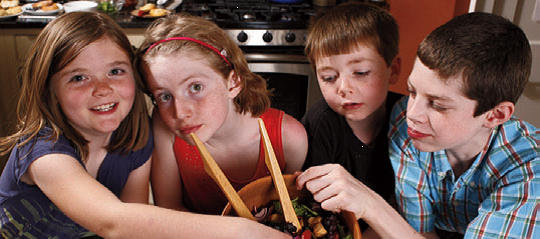BY ADRIANNA EVANS, MPH
While many families are sitting down to enjoy turkey, ham, or another classic holiday dish, these options are not always available to those at the table with some newborn screening conditions. Because some newborn screening conditions impact metabolism, or how the body breaks down and uses food, some conditions require special diets.
Food is a central part of the holiday season. When the weather gets cold and families huddle together for toasty fires, games, and celebrations, there is always a piece of candy or a warm drink within easy reach. Family meals or parties are scheduled often and the table is always bursting with good things to eat, as are many bellies. For the designated chef of the family, this is always a busy time, full of planning, shopping, and chopping. However, meal planning gets even more complicated when taking into account the dietary needs or special preferences of each member of the family.
For individuals and families affected by one of more than 50 conditions that can be detected through newborn screening, the stress of holiday cooking takes on a different sense of urgency. Newborn screening is a public health service that screens babies for life-threatening conditions at birth. While many families are sitting down to enjoy turkey, ham, or another classic holiday dish, these options are not always available to those at the table with some newborn screening conditions. Because some newborn screening conditions impact metabolism, or how the body breaks down and uses food, some conditions require special diets. Different conditions require different diets, but often low protein, dairy-free, or high fat substitutions are needed for the members of the family who can’t eat traditional recipes.
Luckily, there are plenty of resources and groups out there who have responded and adapted to this need. Families, grocery stores, dietitians, and organizations have banded together to make meal preparation easier for families with these kinds of dietary restrictions. With special diets, it’s always a good idea to check with a dietitian before adding in a new food, but the resources on the following page can provide some ideas to get those cooking juices flowing!
Grocery Lists
The National PKU Alliance released a document containing a list of low protein foods available at Trader Joe’s and Whole Foods, two national grocery chains. These foods are not exclusively made to complement only metabolic diets and so are accessible to all members of the family at the dinner table. Some of the brands listed can be found online or at other stores if Trader Joe’s or Whole Foods are not close by. Find the list at: https://npkua.org/Portals/0/PDFs/trader joes and whole foods.pdf
Social Media Recipe Swaps and Communities
Social media is another useful tool for holiday meal preparation as well. Parents and individuals have formed several groups via social media to share and discuss different recipes or snacks. Checking these during the holidays can provide a lot of useful information as well as a supportive community to those looking for one. Here are a few suggestions of where to start:
• PKU recipes and tips, chat and advice on Facebook: www.facebook.com/groups/229116033923001
• Phenylketonuria (PKU) World Wide Support Group! on Facebook www.facebook.com/groups/PKUworldwidesupport
• Galactosemia Discussion Group on Facebook www.facebook.com/groups/183815918306215
• FOD (Fatty Oxidation Disorders) Family Support Group on Facebook www.facebook.com/groups/59945507904
CookForLove.org
For those on low protein diets for phenylketonuria (PKU), Cook For Love can be a great resource during the holidays. Cook For Love is aware of the challenges parents and families face during the holidays. They prepare special sections with recipes and plans to make holiday cooking easier to manage – just create a free account to access their information. www.cookforlove.org
Baby’s First Test’s Public Square
On November 3, 2017, Baby’s First Test, the nation’s newborn screening resource center, kicked off a discussion on a topic called “Tasting Tradition: Newborn Screening Around the Dinner Table.” This is a great place to exchange stories, recipes, resources, and ideas surrounding keeping kids on track with their special diets during the holiday season, whether you’re looking for information or just want to share. This discussion will be open through the holiday season, so be sure to check it out and add your voice.
www.babysfirsttest.org/tasting-tradition-newborn-screening-around-the-dinner-table
Holiday cooking can be a challenge for anyone, but it is manageable with some planning. These resources, along with a little creativity in the kitchen, can help with the process, but any recipe will taste delicious when served alongside family or friends. Remember, it’s always a good idea to check with a dietitian before adding a new food into any special diet. Season(ing)s greetings!
ABOUT THE AUTHOR:
Adrianna Evans is a Program Coordinator working with Baby’s First Test at Genetic Alliance. She works on several engagement projects at Genetic Alliance, but you can follow some of her work through live videos on the Baby’s First Test Facebook page. Adrianna received her Bachelor’s degree in Biology at Penn State in 2015 and recently earned her Master’s in Public Health from George Washington University in 2017, specializing in Global Health Program Design, Monitoring and Evaluation.

